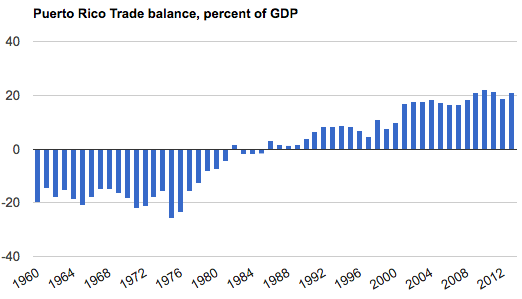
Tyler Cowen directed me to a post by Brad Setser, with this very interesting observation:
I feel I am at risk of becoming a bit shrill on the topic of tax and trade, but it is very hard–in my view–to understand a lot of the trade data without understanding how heavily a lot of trade is influenced by what might be termed chains of tax arbitrage that have nothing to do with conventional tariffs. The trade flows linked to such tax arbitrage are in my view why the U.S. runs a large trade deficit in pharmaceuticals overall, and why most of the deficit is with places like Ireland and Switzerland. And the U.S. would technically run a trade deficit with Puerto Rico if Puerto Rico were disaggregated from the U.S.–even though the ships that sail from the U.S. to Puerto Rico sail to Puerto Rico full and come back almost empty. Welcome to the world of transfer pricing!
Puerto Rico’s economy was a disaster area even before Maria, but at least they almost always run trade surpluses:
Seriously, trade data is so misleading that I sometimes wonder if we would be better off not even collecting it, just as we don’t waste time calculating the trade balance between North and South Dakota.

READER COMMENTS
bill
Oct 8 2017 at 2:12pm
Really interesting. Thanks.
I recall once reading something like the entire US trade deficit was NYC. I have no recollection of what that was based on.
Alec Fahrin
Oct 8 2017 at 3:01pm
Scott,
Just some extra thoughts in relation to this post:
1. If you adjust the US-China trade deficit for the domestic value-added component of China’s exports and IP royalties undercounting, you’d get about a $200 billion trade deficit instead of a $380 billion trade deficit. In other words, what used to seem like a major issue to protectionists becomes essentially nothing.
2. If our concern is unfair trade practices, why don’t we look at trade deficit amounts adjusted per capita? We compete directly with Germany in many industries (unlike China), and have a trade deficit of $1600 for each German. The amount for China? $250.
3. Why do so many people forget that all transactions in international trade are equal? Our importers don’t just hand out dollars as charity, we get a good or service in return for those dollars. Protectionists seem to ignore the fact that we gain $2 trillion in goods and services each year. Other countries get slips of paper in return.
So yes, in modern times, the raw data trade surplus/deficit number is both misleading and inaccurate.
Oh, and if you want another reason why trade numbers are worthless, according to official numbers, the world runs a trade surplus of $500 billion with itself.
https://www.economist.com/blogs/freeexchange/2013/09/global-trade-imbalances
Mark
Oct 8 2017 at 5:09pm
@Alec:
“The world runs a trade surplus of $500 billion with itself.”
Hmm, someone on earth must be laundering money for Martian tax evaders.
In all seriousness, that made my day.
Matthew Waters
Oct 8 2017 at 5:23pm
I would be interested in a trade deficit with the “foreign” pharmaceutical companies taken out.
If a company sells patents below market value to its Irish subsidiary and then that subsidiary “exports” to the US, it’s not really an export.
Balance of Payments still checks out, because the Irish company’s ultimately invests their profits back in American assets. Generally, the Irish company will be completely managed by Americans, in America, with bank accounts also in America. That bank account is right next to the parent’s bank account, but the bank account for the foreign company is an offsetting “capital surplus.”
Andrew_FL
Oct 8 2017 at 5:35pm
C + I + G + NX
You can’t have NGDP targeting w/o collecting the data on nominal net exports.
Scott Sumner
Oct 8 2017 at 7:07pm
Alec, I’ve done posts on per capita CA surpluses, the Nordic countries are especially high.
Andrew, You said:
“You can’t have NGDP targeting w/o collecting the data on nominal net exports.”
Sure you can, just use national income or output data. That equation is expenditure
Comments are closed.